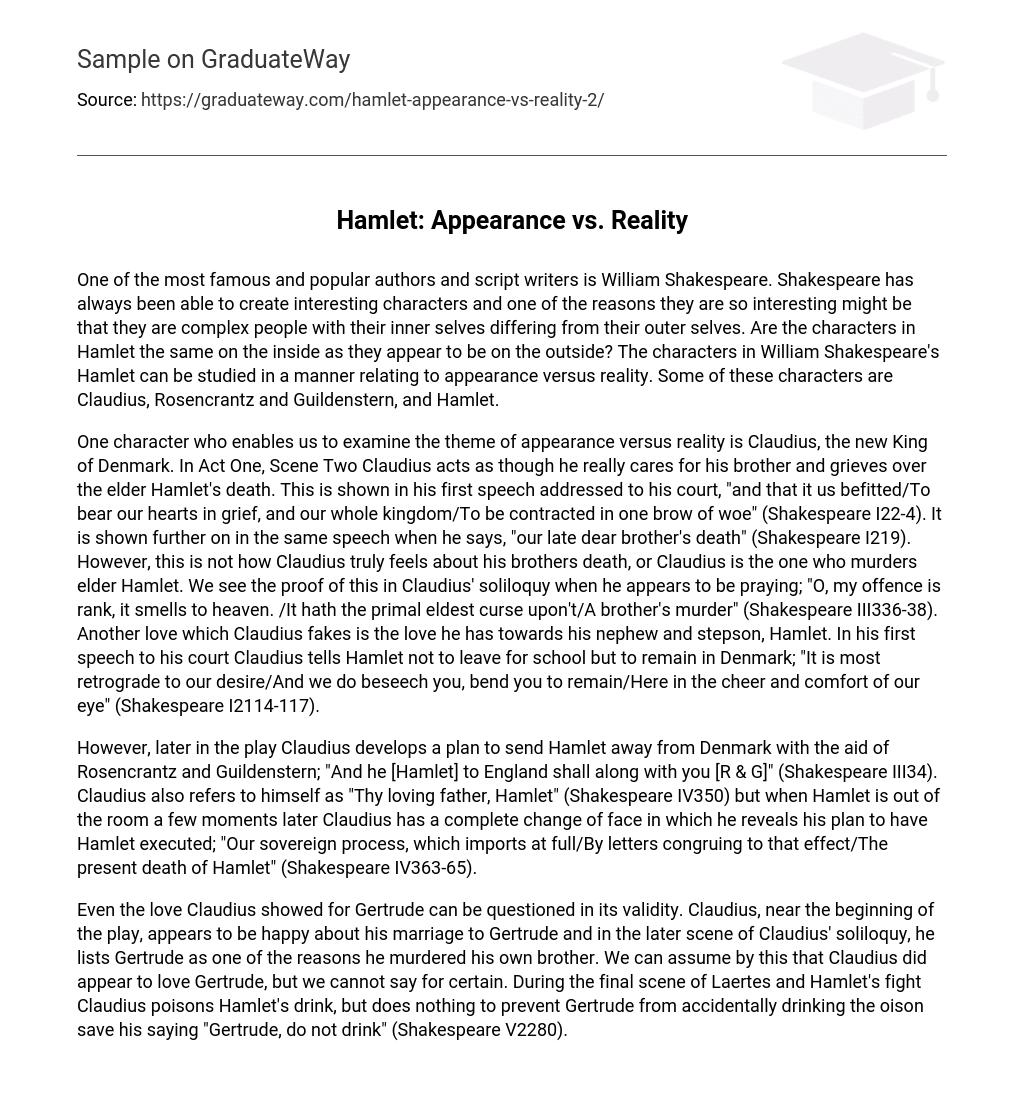One of the most renowned and well-liked authors and script writers is William Shakespeare. Shakespeare has consistently demonstrated his ability to develop captivating characters, and their complexity lies in the distinction between their inner and outer selves. This is particularly evident in the characters of Hamlet, as they prompt an exploration of appearance versus reality. Notable figures such as Claudius, Rosencrantz and Guildenstern, and of course, Hamlet himself, can all be analyzed through this lens.
The theme of appearance versus reality is exemplified by Claudius, the new King of Denmark. In Act One, Scene Two, he pretends to care about his brother and mourns over his death. He speaks to his court, saying that it is fitting for them to grieve and for the entire kingdom to be filled with sorrow. He further refers to his brother’s death as “our late dear brother’s death.” However, this is not Claudius’ true sentiment as he is the one who actually kills his brother, as revealed in his soliloquy when he appears to be praying. He acknowledges that his offense is severe and equates it to the curse of a brother’s murder. Claudius also feigns love for his nephew and stepson, Hamlet. In his first speech to the court, he urges Hamlet not to leave for school but to stay in Denmark, emphasizing that it goes against their wishes and requesting him to remain under their watchful care.
However, later in the play, Claudius devises a plan to send Hamlet away from Denmark with the assistance of Rosencrantz and Guildenstern. In Act III, Scene 4, Claudius says, “And he [Hamlet] to England shall along with you [R & G].” Despite referring to himself as “Thy loving father, Hamlet” in Act IV, Scene 5, Claudius quickly changes his demeanor when Hamlet leaves the room. In this moment, he reveals his intention to have Hamlet executed by saying, “Our sovereign process, which imports at full/By letters congruing to that effect/The present death of Hamlet.”
The questionability of Claudius’ love for Gertrude is evident. Initially, Claudius appears content with their marriage. However, in his soliloquy, he admits that Gertrude played a role in his fratricide. This implies that Claudius did possess some affection for Gertrude, although it remains uncertain. During the final scene, Claudius poisons Hamlet’s drink but takes no action to prevent Gertrude from accidentally ingesting the poison aside from warning her against drinking it. Another instance of perception versus reality occurs with Rosencrantz and Guildenstern, who feign friendship towards Hamlet while secretly serving Claudius and aiding in Hamlet’s demise. Recognizing this deception, Hamlet expresses his distrust of them by likening them to venomous serpents.
One character that explores the contrast between appearances and reality is Hamlet. The most renowned illustration of this theme is Hamlet’s “antic disposition” (Shakespeare I5171), which is later revealed to be merely a facade. As he states, “I am but mad north-north-west: when the wind/is southerly I know a hawk from a handsaw” (Shakespeare II2377-378). Hamlet convincingly portrays his madness, even fooling his own mother, who exclaims, “Alas, he’s mad” (Shakespeare III4105), and his father, who acknowledges, “nor stands it safe with us/To let his madness range” (Shakespeare III31-2).
Hamlet utilizes the play to determine the guilt or innocence of the King, as evidenced by the famous line, “the play’s the thing/wherein I’ll catch the conscience of the king” (Shakespeare II2606-607). The unsuspecting Claudius attends the play, unaware that Hamlet plans to accuse him of murdering his father. Similarly, Hamlet initially welcomes and trusts his old friends Rosencrantz and Guildenstern, exclaiming, “My excellent good friends!” (Shakespeare II2225). However, he eventually realizes their betrayal and orchestrates their deaths.
Hamlet’s love for Ophelia has a dual nature. When he is pretending to be mad, he seems to have no feelings for her, telling her, “You should not have believed me/I did not love you” (Shakespeare III 1117-119). However, after her death, Hamlet expresses his true emotions by saying, “I loved Ophelia: forty thousand brothers could not make up for the amount of love I had for her” (Shakespeare V 1270-272). Thus, the play Hamlet exemplifies numerous instances where appearances conceal inner realities. This applies to both Claudius and Hamlet.





